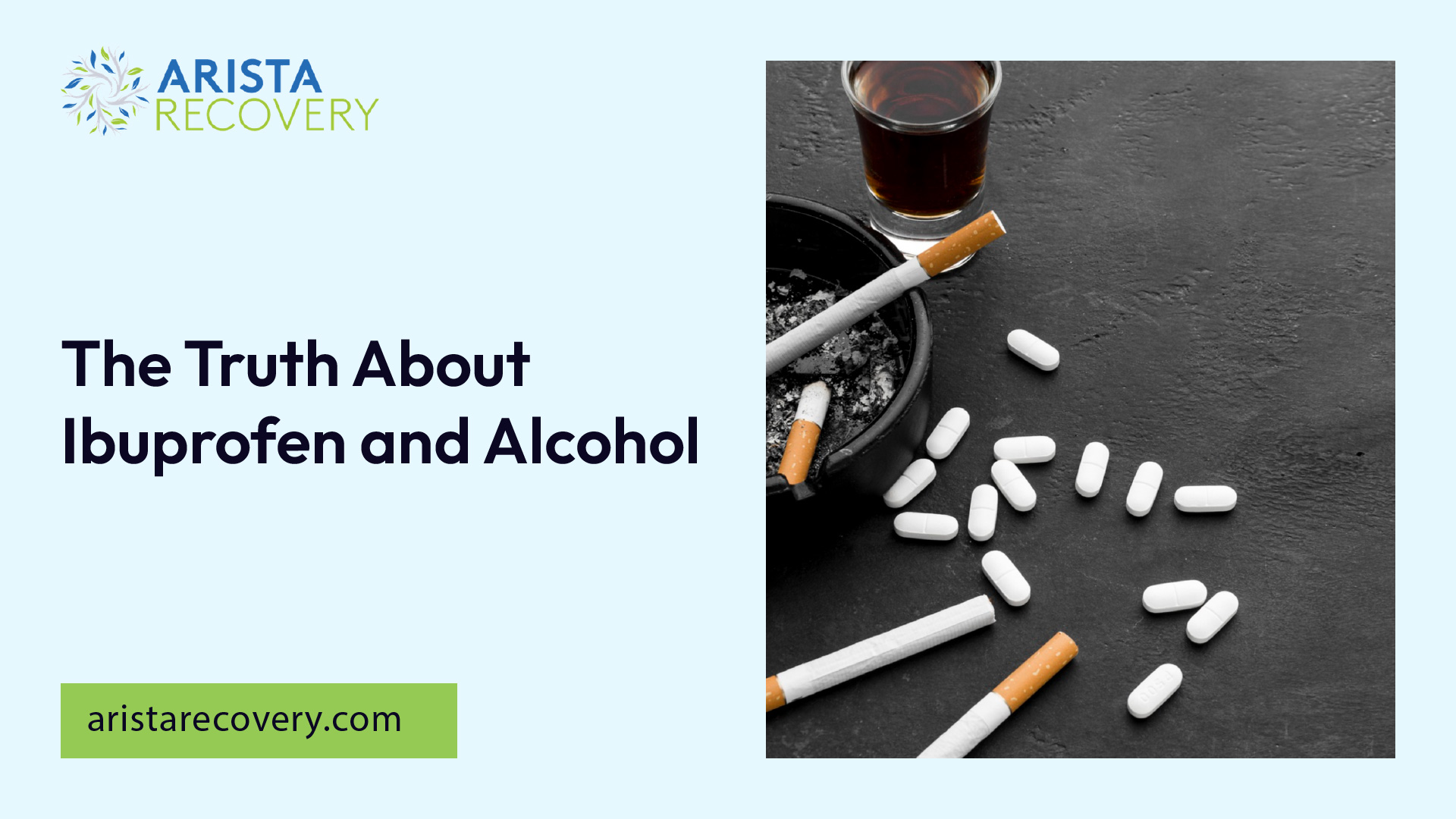The Truth About Ibuprofen and Alcohol

Alcohol and Ibuprofen Interactions
The combination of alcohol and ibuprofen can lead to serious health risks. While both substances may be consumed independently in moderation, their combined use can result in significant damage to the body.
Risks of Combining Alcohol and Ibuprofen
Regular use of ibuprofen has been found to increase the risk of acute upper gastrointestinal bleeding, especially when combined with alcohol [1]. A study of 1,224 participants confirmed these findings, demonstrating that regular ibuprofen users who also consumed alcohol faced an elevated risk of stomach and intestinal bleeding [2]. In contrast, alcohol drinkers who only used ibuprofen occasionally did not exhibit this increased risk.

The relative risk of acute upper gastrointestinal bleeding varies based on the level of alcohol consumption. Compared with those who consume less than one alcoholic drink per week, the risk increases with the quantity of alcohol consumed, rising to 2.8 among those who consume 21 or more drinks per week.
The above table presents a clear indication that the concurrent use of ibuprofen and alcohol can lead to serious health issues, particularly concerning gastrointestinal health.
Impact on Gastrointestinal Health
The combined use of alcohol and ibuprofen substantially impacts gastrointestinal health. Both substances can independently irritate the lining of the stomach and intestines, leading to inflammation and bleeding. When used together, this risk is significantly exacerbated.
The findings suggest that acute upper gastrointestinal bleeding is similarly associated with the use of aspirin and ibuprofen at all levels of alcohol consumption. As heavy alcohol intake independently increases the risk, the incidence of upper gastrointestinal bleeding is highest among persons who are both heavy drinkers and regular users of aspirin or ibuprofen.
Therefore, for individuals who regularly consume alcohol, it is essential to understand the risks of combining this habit with ibuprofen usage. The potential damage to the gastrointestinal tract can lead to serious health complications, and as such, it is recommended to avoid the concurrent use of these substances.
Effects on Kidneys
The combination of ibuprofen and alcohol can have detrimental effects on the kidneys. Both of these substances independently exert a certain amount of strain on the kidneys, and their concurrent use can lead to exacerbated damage.
Ibuprofen's Influence on Kidney Function
Ibuprofen, like other NSAIDs, can impact kidney function by inhibiting the production of an enzyme called cyclooxygenase (COX). This enzyme plays a role in reducing inflammation and pain, but its inhibition can also temporarily impair kidney function. This is due to the key role that COX enzymes play in maintaining the balance of fluids and electrolytes in the kidneys. When these enzymes are inhibited, it can lead to fluid retention, electrolyte imbalances, and in severe cases, acute kidney injury.
Moreover, the risk is greater for those who have pre-existing kidney conditions or are at risk of kidney disease. As such, individuals with a history of kidney issues should consult a doctor before taking ibuprofen, especially in conjunction with alcohol.
Alcohol's Role in Kidney Damage
Alcohol, on the other hand, independently adds strain to the kidneys. Regular heavy drinking doubles the risk of developing chronic kidney disease. Alcohol is a toxin that the kidneys have to filter out, and over time, excessive alcohol consumption can lead to kidney damage.
When alcohol is consumed in conjunction with ibuprofen, the strain on the kidneys is compounded, which can potentially lead to more serious kidney problems. The effects of alcohol and ibuprofen on the kidneys serve as a reminder of the importance of moderation and caution when using these substances, particularly in combination.
Knowing how both ibuprofen and alcohol impact kidney function can help in making informed decisions about their use and the potential risks associated with their combined use. Always remember to consult with a healthcare provider if there are any uncertainties or concerns.
Liver Health Concerns
The impact of combining ibuprofen and alcohol extends beyond the gastrointestinal and renal system, potentially posing serious risks to liver health as well.
Ibuprofen and Liver Injury
Ibuprofen, one of the most commonly used non-steroidal anti-inflammatory drugs (NSAIDs), can cause a range of adverse effects, including liver toxicity. In fact, NSAIDs like ibuprofen are among the leading causes of drug-induced liver injuries, contributing to about 3 to 23 cases per 100,000 patient years. Some NSAIDs have even been removed from the market due to their hepatotoxic side effects [4].
Alcohol's Contribution to Liver Damage
The role of alcohol in exacerbating the liver toxicity of NSAIDs cannot be overlooked. Studies have shown that acetaminophen, another NSAID, is contraindicated for patients who consume alcohol due to the increased risk of liver toxicity. While fewer studies have examined the interaction of ibuprofen with alcohol, it is suggested that the simultaneous intake of these substances can enhance liver toxicity.
A significant increase in hepatotoxicity occurs upon extended exposure to both ibuprofen and alcohol, especially in 3D culture experiments. This suggests a synergistic effect of the two substances on liver cells. The mechanism underlying this synergistic hepatotoxicity appears to be oxidative stress, as evidenced by the increased production of reactive oxygen species (ROS) and the expression of the endogenous antioxidant system.
Understanding the potential risks of combining ibuprofen with alcohol, particularly in terms of liver health, underscores the need for caution and consultation with healthcare providers when using these substances.
Cognitive and Motor Impairment
The combination of ibuprofen and alcohol can have significant effects on cognitive and motor functions. It can heighten certain side effects, leading to impairments that could pose potential safety risks.
Drowsiness and Coordination Issues
Alcohol and ibuprofen can both cause drowsiness and impair coordination. When combined, these effects can be heightened, leading to excessive sleepiness or reduced functionality. The sedative effects of ibuprofen can be enhanced by alcohol consumption, potentially resulting in increased drowsiness and an inability to function normally.
The impaired coordination caused by both substances can lead to difficulty in performing tasks that require precision and balance. This could be particularly dangerous when performing activities like operating machinery or even just walking down the stairs.
Driving Safety Concerns
One of the major concerns associated with the combined use of ibuprofen and alcohol is its potential impact on driving safety. The Centers for Disease Control and Prevention (CDC) strongly advises against drinking alcohol and driving due to alcohol's impact on reaction times and coordination. This risk is further amplified when combined with substances like ibuprofen that can induce drowsiness.
Impaired coordination and slowed reaction times make it unsafe to drive or operate machinery. The combination of alcohol and ibuprofen can potentially lead to accidents, injuries, and even fatalities.
In summary, while both alcohol and ibuprofen are commonly used substances, their combined effects on cognitive and motor functions can be potentially risky. It's important to be aware of these potential risks and consult with healthcare providers when necessary.
Older Adults and Medication Risks
The risks associated with mixing ibuprofen and alcohol are particularly pronounced in older adults. Age-related changes in the body's metabolism, along with the likelihood of older adults taking multiple medications, exacerbate the dangers of combining these substances.
Age-Related Vulnerabilities
Older adults, particularly those over 65, face heightened risks due to alcohol-medication interactions. Age-related changes in how the body responds to alcohol and medications contribute to this increased risk. About 80% of people aged 65 and older took a medication in the past year that could interact with alcohol, and this percentage is increasing [5].
The body's ability to metabolize alcohol and medications changes with age, making older adults more susceptible to complications when combining alcohol with medication. Complications can range from increased drowsiness to more serious health implications, including liver and kidney damage.
Medication-Related Complications
In the United States, it is common for older adults to take medications while also consuming alcohol regularly. This practice can increase the risk of complications such as falls, accidents, and adverse drug interactions. Older adults should exercise caution and consult healthcare providers regarding the interaction of medications with alcohol [3].
The likelihood of older adults taking multiple medications that can interact with alcohol further increases the risk. It's important for older adults to consult healthcare providers about potential interactions between medications and alcohol, especially if they're considering taking ibuprofen while consuming alcohol [6].
In conclusion, while ibuprofen is a commonly used over-the-counter medication, its interaction with alcohol can pose significant health risks, particularly for older adults. It's crucial for individuals in this age group to be aware of these risks and take preventative measures, such as consulting with healthcare providers and limiting alcohol consumption while on medication.
Minimizing Risks
The interaction between ibuprofen and alcohol holds potential risks and side effects. Therefore, it is important to adopt safe practices and consult healthcare providers to avoid potential complications.
Safe Usage Practices
To minimize the risk of adverse effects, individuals should take ibuprofen for the shortest duration at the lowest effective dosage. It is advised to take ibuprofen with food to potentially limit side effects like nausea, vomiting, dyspepsia, stomach pain, and diarrhea.
Reading medication labels carefully to avoid exceeding the safe ibuprofen dose is crucial, especially when using combination medications. Moreover, individuals should exercise caution when considering ibuprofen for hangover relief, as alcohol sensitivity may be heightened during this period [3].
Combining alcohol with certain medications, particularly those with sedative effects, can increase the risk of adverse events, including falls, driving accidents, and fatal overdoses. It's worth noting that the more alcohol a patient consumes, the greater the risk for alcohol and medication interactions.
Consultation with Healthcare Providers
Consulting healthcare providers is an essential step towards safe practices. They can provide guidance on safe long-term pain management strategies that minimize the risk of complications associated with the consumption of ibuprofen and alcohol.
It is important to monitor for risk factors when someone is suspected of mixing ibuprofen with alcohol and to seek help promptly to prevent accidents. Signs of addiction and general physical symptoms can be indicators of such behavior.
In conclusion, the combination of ibuprofen and alcohol should be avoided due to the potential health risks. If you find yourself needing to take ibuprofen regularly, it's advised to seek medical advice to ensure you're doing so safely. Always remember, it's better to be safe than sorry when it comes to your health.
References
[1]: https://pubmed.ncbi.nlm.nih.gov/10566713/
[2]: https://www.healthline.com/health/pain-relief/ibuprofen-alcohol
[3]: https://www.medicalnewstoday.com/articles/mixing-ibuprofen-and-alcohol
[4]: https://www.ncbi.nlm.nih.gov/pmc/articles/PMC7921853/
[5]: https://www.niaaa.nih.gov/health-professionals-communities/core-resource-on-alcohol/alcohol-medication-interactions-potentially-dangerous-mixes
[6]: https://newchoicestc.com/blog/mixing-ibuprofen-alcohol/
When mental health challenges and addiction intersect, it can feel isolating. At Arista, we offer compassionate, evidence-based, and trauma-informed care to help you heal, grow, and move forward.
You’re not alone in this.
When mental health challenges and addiction intersect, it can feel isolating. At Arista, we offer compassionate, evidence-based, and trauma-informed care to help you heal, grow, and move forward.
Support that moves with you.
You’ve taken a brave first step. At Arista Recovery, we’re here to help you continue with best-in-class care designed for long-term healing and support.
.webp)






